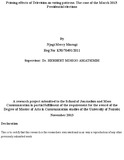| dc.description.abstract | This study was an evaluation of the effect of priming from TV media on the decision making
patterns of the Kenyan people, during the March 2013 presidential elections. The objectives of
the study were to investigate the quality of political information received from TV media in
Kenya during the election period, to analyze the information seeking patterns of the Kenyan
public based on their economic disposition, and to asses if the political content on TV media
has an influence on their voting patterns.
The study was limited to Nairobi County and focused on three groups of people, the affluent
community, middle class, and people living in the slums. The research design was mixed.
Data was collected from the sample population by use of questionnaires and interviews, with
both structured and opinion questions.
The study analyzed the agenda setting theory, and this was in reference to the ability of media
to influence the salience of topics on the public agenda, either by giving emphasis on certain
Issues or ignoring some.
The research brought out the element of bias in political content during the election period
under study; it also confirmed the influence of such bias to the voting patterns of the people of
Nairobi County. The study also confirmed the presence of other variables that tend to affect or
reduce the influence of media to the public. The study found that, people living in the slums
and the less educated in the middle class community, tend to be more influenced by TV
content than the more educated middle class and affluent communities.
The study recommends that media should be sensitized on their influence on the public and
monitored closely to ensure accountability to the public, the public should be sensitized on
media roles to ensure they hold media fraternity accountable in terms of content, government
should put in place firm guidelines on media, to ensure that the policies governing media are
even across the board and expect quality information for the masses. | en_US |


